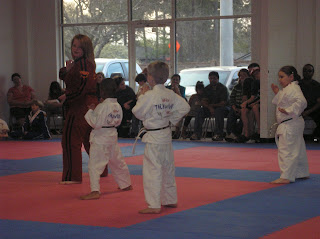It is thought that Hagar was given to Sarai by Pharoah. Some even think that she was Pharoah's daughter, royalty, "for he preferred to see his daughter the servant of Sarah to reigning as mistress in another harem" (Ginzberg, Legends, 1:223).
Sarah was unable to get pregnant so... (Genesis 16:1)
And Sarai said unto Abram, Behold now, the Lord hath restrained me from bearing: I pray thee, go in unto my amaid; it may be that I may obtain children by her. And Abram hearkened to the voice of Sarai.In revelation given to Joseph Smith, we learn that was commanded by God to have her husband marry Hagar. D&C 132:65...
[Sarah] administered unto Abraham according to the law when I commanded Abraham to take aHagar to wife.This implies that Hagar was a righteous woman if she was to carry Abraham's seed and to become part of the family, even she was a "concubine" instead of chief wife. And, if you're curious, a concubine is a legal wife who was elevated from servant status by marriage. She was no equal to the chief wife who was always a free woman.
Hagar ended up getting pregnant which caused a bit of contentious between these two righteous women as we read in Genesis 16:4-6:
And he went in unto Hagar, and she conceived: and when she saw that she had conceived, her mistress was despised in her eyes.When she ran she found a fountain of water in the wilderness. This is where the angel of the Lord found her. This interaction, in itself, is enough to convince me that Hagar was a righteous woman. True, angels have appeared to the unrighteous but it's generally to rebuke them. That isn't what happens here. The angel comforts her and tells her to name her child Ishmael.
5 And Sarai said unto Abram, My wrong be upon thee: I have given my maid into thy bosom; and when she saw that she had conceived, I was adespised in her eyes: the Lord judge between me and thee.6 But Abram said unto Sarai, Behold, thy maid is in thy hand; do to her aas it pleaseth thee. And when Sarai dealt hardly with her, she fled from her face.
The well that Hagar and the angel spoke was called Beer-lahai-roi which, according the footnotes means "The well of him who liveth and seeth me". And... Ishmael means "God hears". God heard Hagar's cries and sent an angel to comfort her and give her the choice to return to Abraham and Sarah.
In those days infant mortality rate was not good. When a child was weaned (generally at the age of 3) was cause for celebration because the child made it through the high risk time of life. This is also when Sarah decided that it was time to send Hagar and Ishmael away. For me, I always thought this was cruel and selfish of Sarah. Even Abraham thought,
"the thing was very grievous in Abraham's sight because of his son" (Genesis 21:11).In Genesis 21:9 we learn that Sarah saw Ishmael mocking Isaac. Then, in Galatians 4: 29, Paul refers to it as Ishmael persecuting Isaac. Either way, it seems that Sarah feared for Isaac's safety so she said that Abraham should cast them out. In Genesis 20:12 we read,
And God said unto Abraham, Let it not be grievous in thy sight because of the lad, and because of thy bondwoman; in all that Sarah hath said unto thee, hearken unto her voice; for in aIsaac shall thy bseed be called.Abraham was again told to hearken Sarah's words. In this time, if a chief wife saw cause to reprimand a concubine then she had three choices.... free the concubine and send her off on her own (usually with a paper stating her emancipation), return her to servitude or punish her. So, really, Sarah chose the best consequence that was available. Hagar and Ishmael would be free! There is further proof of Hagar's freedom in Genesis 21:21 when Hagar alone chose a wife for Ishmael out of Egypt. A slave couldn't have done that.
Abraham gave them away with food and water but when it was gone Hagar feared for the death of her son who was seventeen by this time. She laid him under a bush and turned away because she didn't want to see him die. God heard the voice of Ishmael and sent an angel to Hagar again. The angel asked 'What is wrong with you, Hagar?' Then told her not to worry because her son was heard. The angel continued to say (Genesis 21),
18 Arise, lift up the lad, and hold him in thine hand; for I will make him a great anation.
19 And God aopened her eyes, and she saw a well of water; and she went, and filled the bottle with water, and gave the lad drink.
Ishmael did have a great nation, as promised to Hagar.
Genesis 25We assume that there were good feelings between Ishmael and his father, Abraham, because in Genesis 25:9 Ishmael and Isaac bury Abraham together.
12 ¶Now these are the agenerations of Ishmael, Abraham’s son, whom bHagar the Egyptian, Sarah’s handmaid, cbare unto Abraham:
13 And these are the names of the sons of aIshmael, by their names, according to their generations: the firstborn of Ishmael, Nebajoth; and Kedar, and Adbeel, and Mibsam,16 These are the sons of Ishmael, and these are their names, by their towns, and by their castles; atwelve princes according to their nations.
Now for our questions to ask ourselves:
- What is unique about this woman and her story?
- How does she fit into the time period in which she lived?
- What Christlike qualities does she exemplify?
- What would I ask her if I met her?
- How can I relate to her?
- What can I learn from her experiences?
1. What is unique about this woman and her story? Hagar had nothing and had little choice in what became of her life since she was a servant. However, she was obviously faithful and the Lord looked out for her and made her the mother of nations.
2. How does she fit into the time period in which she lived? Poor Hagar started off as a servant from Egypt and later became a concubine and then a free single mother.
3. What Christlike qualities does she exemplify? She knew that God lived and watched her. He was there when she needed help and she trusted Him that He knew what was best for her or she never would have returned to Abraham the first time she fled.
4. What would I ask her if I met her? I would ask her if she and Sarah were friends before she became Abraham's concubine. It seems like they would have had to have been for Sarah to have chosen her to be part of the family.
5. How can I relate to her? Life wasn't easy for her and I think she tried her best to make something good out of an awkward situation. I try to do the same. ;)
6. What can I learn from her? I can learn to trust in the Lord. Even when all seems hopeless and the chief wife hates me because I'm pregnant and I've run away and in the wilderness, the Lord will still hear my cries and come to me. He will leave the decision up to me but because I trust him so much, I will do what He suggests because He knows and can see the entire picture while I can't. Hopeless to me may mean openings for new opportunities and blessings.





















































